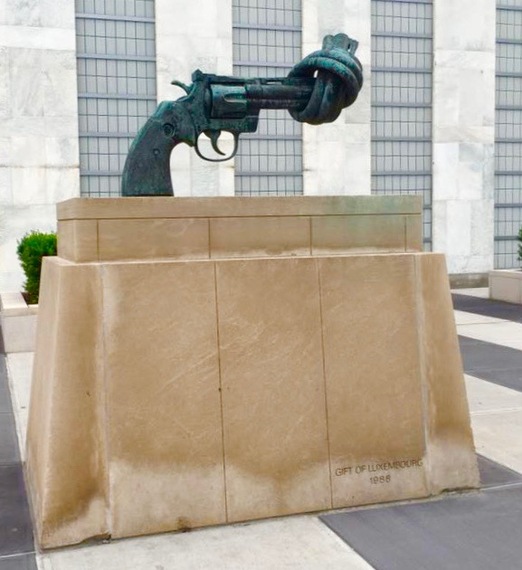Over the past two days, in an effort to bring Americans context on the mass shooting in Orlando, well-meaning media, such as NPR, have presented a range of views in its programming, from the statements of the presidential contenders, to a coterie of imams advising on Islam and tolerance to LGBT activists citing the ways in which LGBT population almost always gets scapegoated for societal ills.
Across the spectrum, listeners have caught the buzzwords: extremism, religiosity, Islam, Christian, mentally ill, repression, homosexuality -- all of the same language also shouted television, on the Internet and on the street. But in the those talking points, cultural, political and activist leaders have once again missed the point entirely, trotting out the same old identity politics to divide us further into camps. When really, our problem does not deal with marginalization, or the civility of one group over another.
The problem with gun violence in the United States is the Second Amendment to the Constitution. Because, let's face it: without a gun, or specifically, a .223 caliber AR type rifle and 9mm semiautomatic pistol, Omar Mateen would still be a confused radical and 50 people would still be alive.
What I would like to know instead: since when does the second amendment trump our First Amendment rights? Or even our basic right to live and breathe in America?
Since never. Not unless one was fighting for the country. A simple search brings up the Second Amendment in its original format: "A well regulated militia being necessary to the security of a free state, the right of the people to keep and bear arms shall not be infringed."
Simple enough. In times of defense of country, as when the U.S. Constitution was signed in 1787 just after the end of the American Revolution, people have the right to keep and use guns. Over the years, however, many interest groups, espousing the same identity politics as they now do, have attempted to interpret that amendment to fit their varying needs. Most of the time, gun safety prevailed.
In the United States v. Cruikshank (1876), after a Ku Klux Klan militia were convicted of massacring an armed group of Republican freedmen, the Supreme Court overturned the convictions, ruling that the Second Amendment did not restrict private citizens from denying other citizens the right to keep and bear arms. "The right to bear arms is not granted by the Constitution; neither is it in any manner dependent upon that instrument for its existence", wrote Chief Justice Morrison Waite, in a decision that, on the surface, favored white protectionism from black militias.
More than 50 years later, the Supreme Court was more explicit. In United States v. Miller (1939), it ruled that the federal government and the states could limit any weapon type not having a "reasonable relationship to the preservation or efficiency of a well regulated militia". In that case, a bank robber had challenged that the National Firearms Act of 1934, which imposed a tax and the registration of certain firearms.
However, in the 21st Century of unlimited freedoms, as more and more disenfranchised people live in fear of each other, they lobby against the "nanny state", afraid of the government taking away their Constitutional right to bear arms. In turn, Congress and the courts have pacified them.
After a series of decisions in favor of gun rights in the first ten years of the new millennium, in Caetano v. Massachusetts last March, the Supreme Court reiterated its earlier rulings in District of Columbia v. Heller (2008) and McDonald v. City of Chicago (2010): "The Second Amendment extends, prima facie, to all instruments that constitute bearable arms, even those that were not in existence at the time of the founding" the Court stated in a per curiam decision. In a concurring opinion, Justice Samuel Alito wrote, that "if the fundamental right of self-defense does not protect Caetano, then the safety of all Americans is left to the mercy of state authorities who may be more concerned about disarming people than about keeping them safe."
Since Caetano was decided, the U.S. has experienced only gun massacres (in which four or more people were killed), including the Pulse nightclub in Orlando, which resulted in 49 deaths -- a respite from 2015. However, since the 2012 shooting at Sandy Hook elementary in Newtown, CT, there have been 998 mass shootings in the U.S., according to the Gun Violence Archive. Among those targeted: school children, Muslims, born-again Christians, teachers, movie-goers, straight people, university students, black people, white people, dancers and LGBT people.
Last night, hundreds of LGBT rights supporters stopped Christopher Street in its tracks for a vigil, stating that they needed to be outside a place that gave them strength, as many do for Pride every year. While they chanted "no hate", the NYPD in full counterterrorism gear, which includes an assault rifle, watched over them.
As a gay person, I went and witnessed and showed solidarity. But as I looked at the police standing watch, fingers on the trigger, I wondered if we should be thinking less about us and our politics than about the good of society as a whole. And the good of society as a whole requires swift measures to control guns in America -- not to bury ourselves in another Us v. Them crusade. For as much as I believe in my First Amendment rights, last night, I was less concerned about them, than about the semiautomatic guns the police were holding to protect all of us.

